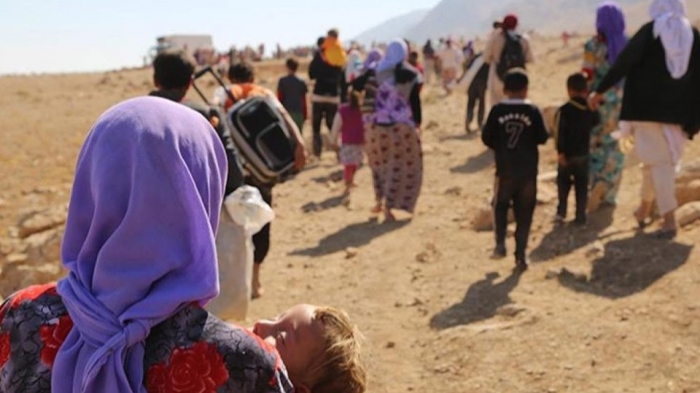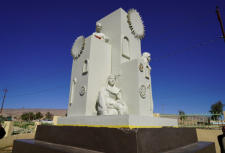Policy Options for Social Integration of Yezidi People in Europe: the Goal of a Society for All

Authors - Olga A. Vorkunova , Samvel Kochoi
Part 2
There is much talk today about a new social architecture. This could hardly be a stand-alone arrangement, but rather embedded in a broader agreement on restructuring the lines of social cooperation. Assessments of the Yezidi displaced peoples’ situation in Germany and France indicate that while progress has been achieved in some areas, significant efforts still need to be made for promoting more inclusive and cohesive societies. The goal of a society, characterized by respect for all human rights and fundamental freedoms, equity, social justice, and equality, remains elusive. The recent genocide of Yezidi minority in Iraq increased the number of displaced people by over 60,000 in Germany. This has led to the heightening of protests and other forms of social peaceful rallies in Herford, Bielefeld, Hanover, Detmold, and Essen, with future events planned in Dortmund, Frankfurt, and Göttingen. Telim Tolan, Chairman of the Central Council of Yezidis in Germany (based in Oldenburg), estimated that the Yezidi minority in Iraq’s Sinjar has been in the midst of a humanitarian catastrophe.
The displaced people are experiencing social exclusion, many turning to unstable forms of subsistence. Poverty is a root cause of social exclusion and must be addressed if social integration is to be achieved. Recognizing people’s right to development, and making it operational, are preconditions to finding effective solutions to many of Yezidi accumulating social problems, including the problem of social integration.The pursuit of social integration is likely to remain largely a matter for national and sub-national settings in Germany and France, but the international community can help establish a supportive atmosphere for Yezidi community. The migration crisis in Europe has forcefully demonstrated the risks associated with violence, crime, and social disintegration. There are indications of a change in approach by the UN, EU, and the USA towards Yezidi situation issues. In the wake of the interest in Yezidi problems within the context of Nadia Murad’s Nobel Peace Prize and the charges related to ISIS atrocities in Iraq and Syria, governments in Germany and France are fully committed to addressing particular attention to the issue of the regulatory framework for monitoring the operations of social institutions at both national and international levels. This should include adoption of measures to control human rights abuses.
Tags:
Policy Options for Social Integration of Yezidi People in Europe: the Goal of a Society for All

Authors - Olga A. Vorkunova , Samvel Kochoi
Part 2
There is much talk today about a new social architecture. This could hardly be a stand-alone arrangement, but rather embedded in a broader agreement on restructuring the lines of social cooperation. Assessments of the Yezidi displaced peoples’ situation in Germany and France indicate that while progress has been achieved in some areas, significant efforts still need to be made for promoting more inclusive and cohesive societies. The goal of a society, characterized by respect for all human rights and fundamental freedoms, equity, social justice, and equality, remains elusive. The recent genocide of Yezidi minority in Iraq increased the number of displaced people by over 60,000 in Germany. This has led to the heightening of protests and other forms of social peaceful rallies in Herford, Bielefeld, Hanover, Detmold, and Essen, with future events planned in Dortmund, Frankfurt, and Göttingen. Telim Tolan, Chairman of the Central Council of Yezidis in Germany (based in Oldenburg), estimated that the Yezidi minority in Iraq’s Sinjar has been in the midst of a humanitarian catastrophe.
The displaced people are experiencing social exclusion, many turning to unstable forms of subsistence. Poverty is a root cause of social exclusion and must be addressed if social integration is to be achieved. Recognizing people’s right to development, and making it operational, are preconditions to finding effective solutions to many of Yezidi accumulating social problems, including the problem of social integration.The pursuit of social integration is likely to remain largely a matter for national and sub-national settings in Germany and France, but the international community can help establish a supportive atmosphere for Yezidi community. The migration crisis in Europe has forcefully demonstrated the risks associated with violence, crime, and social disintegration. There are indications of a change in approach by the UN, EU, and the USA towards Yezidi situation issues. In the wake of the interest in Yezidi problems within the context of Nadia Murad’s Nobel Peace Prize and the charges related to ISIS atrocities in Iraq and Syria, governments in Germany and France are fully committed to addressing particular attention to the issue of the regulatory framework for monitoring the operations of social institutions at both national and international levels. This should include adoption of measures to control human rights abuses.
Tags:

























